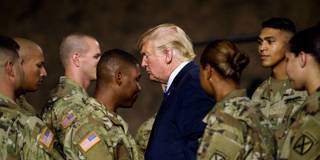US President Donald Trump once seemed to recognize that, as long as the US remains mired in endless wars in the Middle East, it will be unable to address in a meaningful way the threat China poses. But that has not stopped him from perpetuating the cycle of self-defeating American interventionism in the Middle East.
NEW DELHI – “Great nations do not fight endless wars,” US President Donald Trump declared in his 2019 State of the Union speech. He had a point: military entanglements in the Middle East have contributed to the relative decline of American power and facilitated China’s muscular rise. And yet, less than a year after that speech, Trump ordered the assassination of Iran’s most powerful military commander, General Qassem Suleimani, bringing the United States to the precipice of yet another war. Such is the power of America’s addiction to interfering in the chronically volatile Middle East.

NEW DELHI – “Great nations do not fight endless wars,” US President Donald Trump declared in his 2019 State of the Union speech. He had a point: military entanglements in the Middle East have contributed to the relative decline of American power and facilitated China’s muscular rise. And yet, less than a year after that speech, Trump ordered the assassination of Iran’s most powerful military commander, General Qassem Suleimani, bringing the United States to the precipice of yet another war. Such is the power of America’s addiction to interfering in the chronically volatile Middle East.